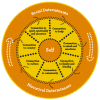Ibobbly mobile health intervention for suicide prevention in Australian Indigenous youth: a pilot randomised controlled trial
- PMID: 28132007
- PMCID: PMC5278278
- DOI: 10.1136/bmjopen-2016-013518
Ibobbly mobile health intervention for suicide prevention in Australian Indigenous youth: a pilot randomised controlled trial
Abstract
Objectives: Rates of youth suicide in Australian Indigenous communities are 4 times the national youth average and demand innovative interventions. Historical and persistent disadvantage is coupled with multiple barriers to help seeking. Mobile phone applications offer the opportunity to deliver therapeutic interventions directly to individuals in remote communities. The pilot study aimed to evaluate the effectiveness of a self-help mobile app (ibobbly) targeting suicidal ideation, depression, psychological distress and impulsivity among Indigenous youth in remote Australia.
Setting: Remote and very remote communities in the Kimberley region of North Western Australia.
Participants: Indigenous Australians aged 18-35 years.
Interventions: 61 participants were recruited and randomised to receive either an app (ibobbly) which delivered acceptance-based therapy over 6 weeks or were waitlisted for 6 weeks and then received the app for the following 6 weeks.
Primary and secondary outcome measures: The primary outcome was the Depressive Symptom Inventory-Suicidality Subscale (DSI-SS) to identify the frequency and intensity of suicidal ideation in the previous weeks. Secondary outcomes were the Patient Health Questionnaire 9 (PHQ-9), The Kessler Psychological Distress Scale (K10) and the Barratt Impulsivity Scale (BIS-11).
Results: Although preintervention and postintervention changes on the (DSI-SS) were significant in the ibobbly arm (t=2.40; df=58.1; p=0.0195), these differences were not significant compared with the waitlist arm (t=1.05; df=57.8; p=0.2962). However, participants in the ibobbly group showed substantial and statistically significant reductions in PHQ-9 and K10 scores compared with waitlist. No differences were observed in impulsivity. Waitlist participants improved after 6 weeks of app use.
Conclusions: Apps for suicide prevention reduce distress and depression but do not show significant reductions on suicide ideation or impulsivity. A feasible and acceptable means of lowering symptoms for mental health disorders in remote communities is via appropriately designed self-help apps.
Trial registration number: ACTRN12613000104752.
Keywords: Aboriginal and Torres Strait Islander; Acceptance and Commitment Therapy; Indigenous Australian; Suicide Prevention; eHealth; mHealth.
Published by the BMJ Publishing Group Limited. For permission to use (where not already granted under a licence) please go to http://www.bmj.com/company/products-services/rights-and-licensing/.
Conflict of interest statement
Conflicts of Interest: None declared.
Figures






References
-
- AIH. Overview of Australian Indigenous health status. 2014. Retrieved 25 Oct 16 from http://www.healthinfonet.ecu.edu.au/health-facts/overviews.
-
- Statistics ABS. Aboriginal and Torres Strait Islander suicide deaths. 2012. Retrieved 25 Oct 16 from http://www.abs.gov.au/ausstats/abs@.nsf/Products/3309.0~2010~Chapter~Abo...
-
- Hunter E. Aboriginal health and history: power and prejudice in remote. Australia: Cambridge University Press, 1993.
-
- Tatz C. Aboriginal suicide is different: A portrait of life and self-destruction. Canberra, Australia: Aboriginal Studies Press; 2005:xxv.
Publication types
MeSH terms
Associated data
LinkOut - more resources
Full Text Sources
Other Literature Sources
Medical
Research Materials
Miscellaneous
